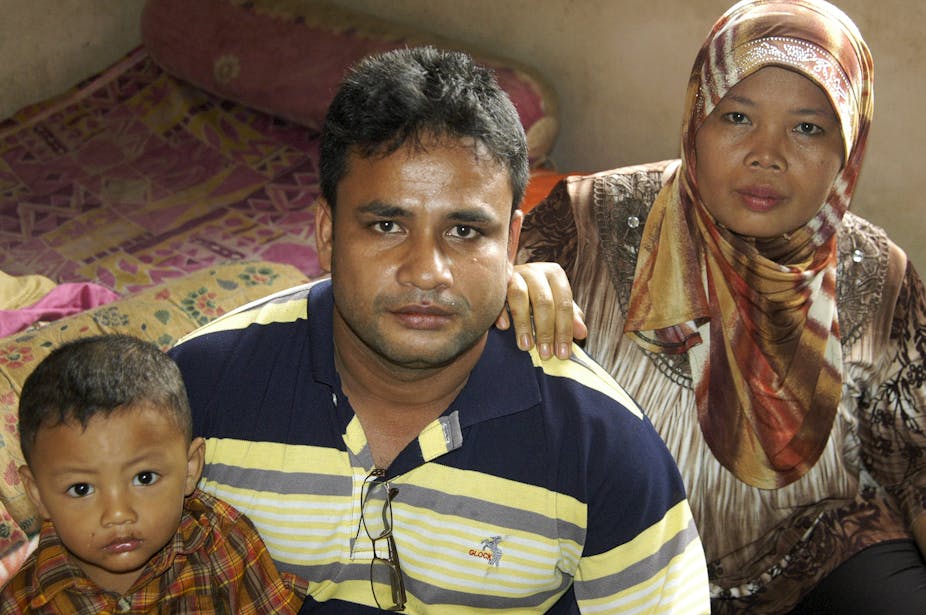There’s a knock on the door. It’s late, and it has been a wild and stormy night. You wonder who could possibly be outside in this weather.
Opening the door you find a young man collapsed on your doorstep, soaked and shivering. He wants to come inside, where it is warm and dry. It is only now that you remember that you signed up for a local safe house program, where you agreed to take people in distress into your home.
But it is late, and you know that your partner will not be happy to find a stranger on the couch in the morning.
So you tell the man to wait. You make a call to the house across the road, which isn’t a registered safe house but always full of people like the man on your doorstep. You tell them that if they take the man in tonight, they can send over two people in the morning.
The solution strikes you as ingenious – now you are looking after two people, not just one, and your partner will be more comfortable with people you know, at least by sight.
Of course, there’s no way of guaranteeing how the man on your doorstep will be treated in the house across the road.
In exactly the same way, there is no way that Australia can guarantee that asylum seekers to be transferred to Malaysia under an amended Migration Act will be treated with “dignity”, as promised by the Malaysian Minister of Home Affairs, Dato’ Seri Hishammuddin bin Tun Hussein last year.
Despite those assurances, and vague commitments in the operational guidelines that “transferees” will “enjoy an adequate standard of treatment”, a swap deal is not and never has been about the well-being of the “transferees”.
This is clear when we consider that Malaysia is not a signatory to the UN Refugee Convention, that Malaysia has a record of human rights abuse, and that refugees awaiting resettlement in Malaysia are routinely subjected to detention, arrest and harassment from both state agents and a volunteer citizen’s police force.
The only way that this agreement can be justified is through the logic of utilitarianism. Famously, British philosopher John Stuart Mill argued that the role of the state was to provide the greatest good to the greatest number.
Under that logic, the idea of accepting 4,000 extra refugees over the next four years in exchange for 800 – raising Australia’s annual intake to 14,750 – is simply good arithmetic. The 800 are to be sacrificed for the greater good.
Yet the language of Julia Gillard and Christopher Bowen has not been that of utilitarianism. They suspect, rightly I imagine, that the idea of sacrificing some people for the benefit of others, is unpalatable to the Australian public.
Instead they have borrowed their language from an entirely different tradition – that of human rights. Last year, they repeatedly insisted that “transferees” will be treated with “dignity and respect in accordance with human rights standards”.
The modern conception of human rights can be traced back to the German philosopher Immanuel Kant. He argued that we should treat others as ends in themselves and not as a means to an end. This is the foundation of our current understanding of each individual person as a unique, inviolable being.
However, treating others as a means to an end is precisely what reviving the swap deal will do. The “transferees” are being used as a means to the dual ends of increasing Australia’s intake of (other) refugees, and of deterring people smugglers.
In doing so, we are outsourcing our moral and legal obligations to the “transferees”. Morally speaking, there is no denying the fact that they will have knocked on our door seeking asylum, and we will have turned them away.
It is no answer to say to the man on your doorstep that you are willing to shelter two others, but that in return he must be sacrificed. It is equally no answer to deny someone shelter in order to “send a message” to someone else.
If we are to take human rights seriously, there is no room to think in terms of aggregate positive outcomes. Each human being is unique, and each appeal for help deserves to be heard.
If the government is unwilling to do this, then it must stop trying to disguise this utilitarian swap deal with human rights rhetoric. That is why criticisms of the deal which have focused on the insufficiency of human rights safeguards in Malaysia do not go far enough.
The key moral question for Australia now, as it was in mid-2011, is whether or not we are willing to participate in the sacrificial logic of utilitarianism.

